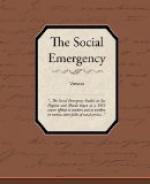4. Fresh air, bathing, and virility.
(a) Sleeping-porches, camping.
(b) How to bathe.
(c) Change of clothes.
5. Virility and disease.
(a) Disease generally an unnecessary evil.
(b) Relative seriousness of tuberculosis,
typhoid, syphilis, gonorrhea,
diphtheria, colds,
headaches, adenoids, enlarged tonsils.
(c) Body and mind.
6. Virility and certain glands.
(a) Importance of the thyroid gland and
the testicles.
(b) Difference between stallion and gelding.
(c) Seminal vesicles.
(d) Quack doctors.
7. Virility and reproduction.
8. Fatherhood and the next generation.
In our attitude toward the boy, we must show him that we respect him, that we have faith and confidence in him, and expect great things of him. We should meet him on the level of a boy’s everyday interests in sport, use simple language, and no unnecessary technical terms. Some workers with boys unwisely force confessions of guilt. We should respect the boy’s right of privacy.
When we deal with boys in the mass, the grouping is difficult. Boys who have reached the period of puberty should be in a separate group from pre-pubescents, and boys who are well advanced in adolescence—those who have been pubescent for two or three years—should be taught in still a third group. This applies to single talks as well as to courses of instruction.
As far as we know the best basis of division between the pubescent and pre-pubescent boy (when physical examinations are not possible) is the change of voice. Only one who understands these matters well and knows the boys should do the grouping. Even such a man should not adopt an arbitrary basis of grouping but must take one boy at a time and place him in the group for which he seems best fitted.
We should endeavor to include the father in our plans of sex instruction and be careful not to break down such confidence as exists between father and son. We shall find that only a small proportion of fathers give their sons any instruction in sexual matters, and that it is difficult to stir them to action. In one investigation, it was found that one hundred boys out of one hundred and twenty-one had received no sex instruction from their fathers.[57]
When confidence between father and son does exist, we should help the father rather than relieve him of his task. It is difficult to discover fathers who have confidential relations with their boys unless each family is dealt with separately. The Oregon Social Hygiene Society has conducted father and son meetings, and has required the father either to accompany the boy or sign a card signifying his willingness to have his son attend. Few fathers have attended, sometimes none at all. On one occasion there were thirty-five boys and not one father.[58] Requiring permission may be regarded as an assumption that the talk is questionable; and, furthermore, the requiring of special permission is likely to create an undesirable attitude on the part of the boy. Plans for father and son meetings which will be free from these objections will possibly be developed by other schools or social hygiene societies. Our aim is so to educate one generation of boys that when they become fathers they will inform their son regarding these sacred relationships and functions of life.




